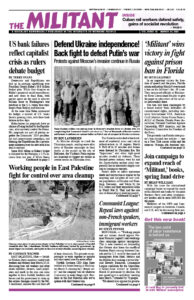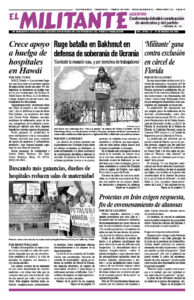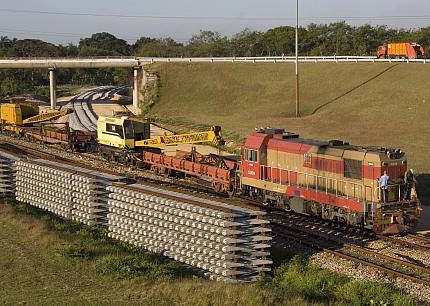HAVANA — While in Cuba for the Havana International Book Fair in February, several volunteers at the Pathfinder Press stand who are rail workers were able to exchange experiences with leaders of Cuba’s National Union of Transportation and Port Workers (SNTTP), which includes rail workers. The visiting rail workers who were part of the discussion organized by the Central Organization of Cuban Workers (CTC) came from Canada, the United Kingdom, and this reporter from the U.S.
Transportation workers in Cuba are on the front lines of defending the gains made by working people through their socialist revolution. Along with other workers and farmers, they are fighting to increase production of much-needed goods and services.
“The biggest challenges we face come from limitations imposed by the U.S. embargo against us,” said Fermín Umpierre, the union’s general secretary. Transportation is one of the industries most disrupted by sanctions imposed by the U.S. government. The impact on the daily lives of the Cuban population is visible everywhere, including the long lines of Cubans waiting at bus stops throughout Havana.
Since 1959, when workers and peasants in Cuba overthrew the U.S.-backed dictatorship of Fulgencio Batista and took state power, ending capitalist exploitation and oppression, the imperialist rulers have waged unrelenting economic, trade and financial warfare against the Cuban people.
Washington’s economic sanctions affect all transport operations, from bus and train service to domestic and international flights to ships entering and leaving the harbor.
Cuba is unable to purchase locomotives and other equipment due to sanctions and fines imposed by Washington on U.S. and foreign manufacturers and banks who would otherwise be eager to trade with Cuba. Companies in Canada and Europe won’t sell them new locomotives, for example, because more than 10% of their parts are made in the U.S. So Cuba’s national railroad company operates decades-old equipment from the U.S., along with equipment from Mexico, China and Russia, all of which increases operation and maintenance costs.
“We’re forced into a captive market with Russia,” said Umpierre. And since Russian locomotives have parts made in both Russia and Ukraine, with the war in Ukraine it has become hard to get those parts, he noted. Cuban planes sent to Russia for maintenance are now stuck there due to the war, he added.
To counter the impact of Washington’s economic war, SNTTP members organize to find innovative ways to keep equipment running by making substitute parts and adapting machinery for other purposes. They are part of the CTC’s National Association of Innovators, a movement founded decades ago that is now made up of tens of thousands of workers from every industry.
In 2019 the Trump administration put into effect Title III of the Helms-Burton Act, passed during the Clinton administration. This provision allows for lawsuits by Cuban Americans demanding compensation from those they claim are profiting from properties that before 1959 they owned — like cruise ship landing docks in Havana — that were nationalized by the revolutionary government.
Fear of retaliation by Washington has driven away U.S. and other foreign investors who want to trade with Cuba, said Umpierre.
A French company that had agreed to invest in modernizing rail repair and maintenance facilities, some of which were built in the 1970s and are badly in need of updating, changed plans because the facility used to be U.S.-owned. The former owners “hope this shop and other properties will again be theirs someday,” said Umpierre.
For the past six decades, workers here have not only resisted Washington’s assault, but continue to extend solidarity to working people around the world who are resisting the consequences of the capitalist crisis worldwide.
Sharp contrast with U.S. conditions
The Cuban trade union leaders we spoke with were keenly interested in the descriptions we gave of conditions in the countries where we live. We described recent labor fights in the United States, from striking nurses to rail workers; in Canada, where school workers beat back a government union-busting attack; and in the United Kingdom, where a number of recent nationwide strikes show the changing moods of working people.
“The rail bosses have been on the offensive for decades,” I told my fellow Cuban unionists. “They’ve slashed crew sizes while making trains longer and cutting back on maintenance and inspections. They’ve also made it harder to get time off, and that’s why workers in the U.S. want to fight back and voted to strike, a move blocked by the intervention of the Biden administration and Congress.”
“How long does it take to become an engineer in Cuba?” asked Felix Ardea, a conductor in Montreal. “In Canada and the U.S., the bosses rush the training.”
“Here it takes four to five years to become an engineer. To be qualified to be in charge of the train it takes 10 years,” said Agustín Robert Sánchez, a former rail worker now working as an official in the union’s port workers section. “We want to make sure the engineers and conductors really know how to operate the equipment and know the routes,” said Alberto Morey, a leader of the union’s rail sector.
“Where I work in California, it’s a 13-week course to become a conductor, and then a worker can quickly sign up to take the six-month engineer training,” I said. “So you can end up with two new people on a crew, in charge of a train that is more than 2 miles long, traveling over a mountain grade and carrying hazardous materials.”
Rail workers’ schedules and shifts in Cuba are in stark contrast to the long hours and scarce time off faced by those of us in the U.S. or Canada. A Cuban train crew is composed of a conductor, a conductor’s assistant, an engineer and assistant engineer, and a mechanic/technical worker. To run the Havana-Santiago route, which takes 16 hours across the island, two crews work eight-hour shifts each. They have a sleeping car for the crew not on duty. Then they have four days off before working again.
We spoke with the Cuban trade unionists in the wake of the derailment in East Palestine, Ohio, when coverage of the disaster was reaching Cuba (see solidarity message from the Cuban unions to rail workers in the U.S.).
They were stunned by our description of the utter indifference of U.S. rail bosses to the safety of both rail workers and communities surrounding rail lines. In Cuba, they told us, accidents of such a magnitude are extremely rare, even despite the major obstacles they face in getting spare parts and materials due to U.S. sanctions.


